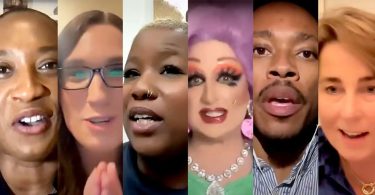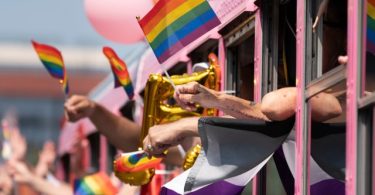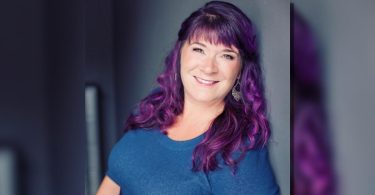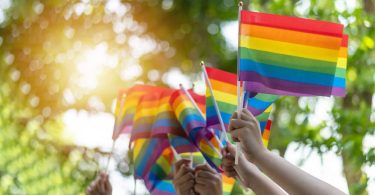Are gay men particularly terrified of getting older?
None of us wants to get older and we’d all like to stop the clock if we could. But I’m beginning to wonder if gay men in particular struggle with ageing.
Now in my late 40s, I think my mental health is pretty good most of the time. For that I’m grateful. But when I look around, I see too many of my peers battling to cope. Struggling to the point of suicide.
Again, this isn’t just a gay problem. Despite the privilege we enjoy, men are disproportionately likely to die from suicide than women by a ratio of around 3 to 1. Some associate this with issues around masculinity: not talking about one’s feelings, and being too afraid or embarrassed to ask for help.
Combine toxic masculinity with homophobia (both internal and external), and it’s little surprise that gay men suffer from additional mental health challenges.
But this still doesn’t explain why I’m seeing so many gay men in their 40s and 50s in distress.
The middle-age hump
Hitting middle-age can be hard. You realize that some dreams or ambitions you’ve held on to will likely never be realized; the lofty career ambitions you had might not materialize; inevitably, you begin to realize your body is not what it was. For most of us, there are probably fewer years ahead than there are behind us.
Images across the LGBTI media focuses heavily on the young and the good-looking. Ageing remains taboo. The commercial gay scene tends to revolve around those in their 20s and 30s. As you become older, it’s easy to feel yourself become more invisible.
It can lead many gay men to begin to feel lost. Lost in a world in which they have already fought to feel accepted.
Then there are the age-related problems. The hot bear who tore up the dance floor in his 30s finds himself trying to avoid type II diabetes in his 40s. Erectile dysfunction can lead some gay men to contemplate a future with a limited sex life.
Heart disease, prostate cancer…. Again, all issues that affect men across the board, but which can bring added stress to those too scared to ask intimate questions of their healthcare provider.
That’s even before the changing image we see in the mirror.
Putting themselves at risk
I realize no-one enjoys getting older. Other group in the LGBTI spectrum face their own unique struggles. I’m concentrating on gay men because it’s what I know and because I’m hearing of far too many in my peer group who are in a mess. If it’s not struggling with depression, it’s overdosing on drugs or putting their sexual health at risk at party’n’play sessions.
There’s much work going on these days to provide role models for LGBTI youth. Organizations such as the UK-based Diversity Role Models take gay, bi and trans people into schools to talk to kids. Compared to when I was a teenager, there are many out pop stars, actors and social media stars.
Lack of role models
This is fantastic. But where are the older LGBTI role models? Where are the elders to demonstrate that entering your 50s, 60s and beyond needn’t be seen as bleak and hopeless?
Instead, we live in a culture in which everyone’s desperately pretending that they’re not getting old. Health-related problems are not openly discussed. We make appointments with cosmetic clinics for the discreet nip, tuck or injection.
Straight parents and grandparents provide some sort of template or role model for our straight counterparts. Having children inevitably rearranges one’s priorities, and I know that an increasing number of gay men are exploring this option. But when one is single, childless, and gay, who am I supposed to be aping in my older years?
Then there’s the whole thing about sexuality and age. When someone over a certain age – hetero or homo – expresses their sexuality – it’s seen by many as creepy or unattractive (ask Madonna!). This is despite the fact that many continue to have regular sex lives into old age.
Sure, there are some older LGBTI figures of note. The likes of Elton John and Ian McKellen spring to mind. But again, how many more older gay elders would there be were it not for the AIDS crisis of the 80s and 90s? It literally wiped out a whole generation – and the hole left behind continues to impact those coming up behind them.
Feeling the same inside
Over 20 years ago, my late dad, in his 60s at the time, told me that ageing was a strange sensation as inside, mentally, he still felt exactly the same as he did when he was 18. I now appreciate what he means. Inside, we are the same person as we were when younger. It’s just the exterior that’s changing – and not in a way any of us will enjoy.
When I moved to London for university as an 18-year-old, I vowed that the next ten years of my life would inevitably be the most wild and hedonistic of my life. That’s what life’s supposed to be like in your 20s, right?
The decade duly turned out that way. In fact, I stretched out the partying into my 30s, when my body literally demanded I ease up a bit.
Next year, I will enter my 50s. Single and gay, I have no idea what my life is supposed to like or what template I’m supposed to follow. Am I supposed to retire to the coast? Become the eccentric uncle figure?
Embracing each decade
Sometimes that lack of a template is scary. Even though there is evidence that happiness peaks in your 20s and 60s.
My way of of trying to deal with it is to try and plot my own course and create opportunities to look forward towards.
The next ten years will not be the wildest of my life. But I’ve decided that I’m going to do everything I can to make them the most interesting – in whatever form that might take.
Whereas when younger I had a problem embracing change, I’ve learned that change is good: staying the same is boring when life is only so finite. Packing as many experiences into life is what makes it interesting.
And I’m not going to be invisible. If I have a platform, I will be an out, proud, gay 50-something. As a community, we must shatter the illusion that being gay is something enjoyed only by those who go to gay clubs or can get their abs out on Instagram.
We’re constantly being told that we living in an ageing world. Developments in medicine mean that we’re all living longer. This is particularly true for gay and bi men following advances in HIV treatment. We need to start learning how to live happy gay lives into our old age – and we need to support each other a more as we do it.
See also
Need support? LGBTI helplines for those in crisis or seeking advice
Gay men over 45 far more likely to be single – and these are the reasons why
HIV positive gay man’s inspiring tweet on 50th birthday goes viral







